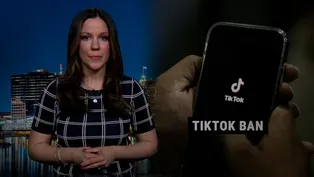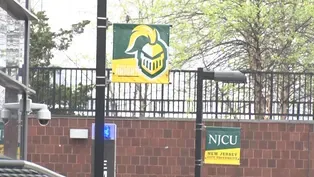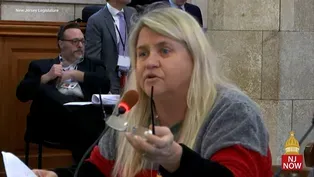NJ Spotlight News
NJ law looks to expand services for deaf community
Clip: 3/13/2024 | 4m 46sVideo has Closed Captions
Legislation to expand mental health services for people who are deaf or hard of hearing
A bill that will go before New Jersey lawmakers this week would require the state to not only recruit more mental health providers who are fluent in American Sign Language, but also ensure they can communicate appropriately with patients. NJ Spotlight News' mental health writer, Bobby Brier, has been digging into the legislation and shares more.
Problems with Closed Captions? Closed Captioning Feedback
Problems with Closed Captions? Closed Captioning Feedback
NJ Spotlight News is a local public television program presented by THIRTEEN PBS
NJ Spotlight News
NJ law looks to expand services for deaf community
Clip: 3/13/2024 | 4m 46sVideo has Closed Captions
A bill that will go before New Jersey lawmakers this week would require the state to not only recruit more mental health providers who are fluent in American Sign Language, but also ensure they can communicate appropriately with patients. NJ Spotlight News' mental health writer, Bobby Brier, has been digging into the legislation and shares more.
Problems with Closed Captions? Closed Captioning Feedback
How to Watch NJ Spotlight News
NJ Spotlight News is available to stream on pbs.org and the free PBS App, available on iPhone, Apple TV, Android TV, Android smartphones, Amazon Fire TV, Amazon Fire Tablet, Roku, Samsung Smart TV, and Vizio.
Providing Support for PBS.org
Learn Moreabout PBS online sponsorshipPeople who are deaf and hard of hearing in New Jersey could soon have more access to mental health services, including more professionals who are fluent in American Sign language.
A bill that will go before lawmakers this week would require the state to not only recruit more of those providers, but also ensure they can communicate appropriately with patients.
Research shows people who are deaf and hard of hearing are subject to more risks to their mental health.
And according to state health records, there are roughly 850,000 residents across New Jersey living with varying degrees of hearing loss.
Our mental health writer Bobby Brier has been digging into the legislation and is with me for the latest.
Bobby, thanks so much.
This is a really interesting topic.
Where did the need come from?
Are there just not enough folks who are trained in this?
Yeah, unfortunately that is really the case right now, and it's kind of mirroring the mental health shortage of professionals that we're seeing not only across the state but across the nation.
This is particularly a severe shortage, unfortunately, for folks who are deaf and hard of hearing.
Some experts that I had spoken to had mentioned that there are just ten master's level mental health clinicians across the state who are fluent in American sign language.
To that point of folks who are well over 800,000 of whom who are deaf and hard of hearing.
We're seeing that those numbers just don't add up when somebody needs the services.
And a lot of times because there's that lack of services that could really influence and aggravate anxiety and depression in many situations.
Wow.
And I don't want to understate that.
So almost a million residents who could be in need and less than ten providers.
So why is it that this population is at such a greater risk?
What is it about it that's really exacerbating mental health issues?
There's a number of different factors.
I think one that is most important is the communication barrier in a lot of different aspects.
A lot of times if somebody needs to reach out for help, if they do not have an interpreter or somebody who was able to help them through that process, that could oftentimes then lead to heightened anxiety and depression.
There's also living in a world where there's many people who are part of the hearing population.
That could often exacerbate those challenges as well.
So there's a number of different layers to this with the communication barrier being probably the most prominent.
And so isolating, I would imagine, too, especially coming out of these past few years and not necessarily having the right avenues to go down.
Yes.
And, you know, folks have spoken about that, you know, the exacerbation of these mental health issues under the pandemic only made things worse.
You know, this bill would really what advocates have said, it would be a step in that direction to recruit and retain more mental health professionals who are not only fluent in American Sign language, but also many other different sciences systems.
And then it would also be requiring the state to have a deaf services coordinator.
This would be a state official who essentially would oversee the implementation and hiring and retaining of these mental health professionals to ensure that more people receive more services.
So where does the bill stand?
It's going before a Senate committee this week.
What's what's the plan there?
It is.
So it's up in front of the Senate Health, Human Services and senior citizens Committee tomorrow.
You know, there has been a widespread support leading up to the hearing tomorrow.
After that, it would, of course, make its way through the Senate and then the assembly.
But of course, there's that question of funding and where that will go from here.
We know that we have an upcoming budget and what that may mean.
And is it limited to mental health care?
Because we know just statewide there's a lack of specialized care, especially when you're talking about these populations.
Right.
It would be in certain cases, primary health care, but particularly focusing on mental health care for for this bill in particular.
And is there any type of estimate at this point about how much state funding would be needed?
Because we're not just talking about hiring these folks, but they have to be trained in what you and I were talking about, different dialects of American Sign language.
Right now, the state lawmakers that I spoke to for this bill were not specific on the amount of funding that would need to go towards it, but it would be have to be substantial to your point, to hire and retain folks.
And one source that I spoke with who who does hire folks who provide mental health services for people who are deaf and hard of hearing in Paterson, spoke about just how difficult it is to find people to fill these slots, oftentimes taking up to a year to find somebody.
So there's the time issue and then there's also the money issue as well.
That's significant for sure.
Bobby Brier for us will be following this hearing.
Thanks so much.
Thank you, Briana.
House passes bill that could ban TikTok
Video has Closed Captions
Clip: 3/13/2024 | 7m 11s | Interview: Nadine Farid Johnson of Knight First Amendment Institute at Columbia University (7m 11s)
Muslims in NJ celebrate Ramadan amid difficult times
Video has Closed Captions
Clip: 3/13/2024 | 4m 11s | Islamophobia and the Israel-Hamas war has shifted the tone of the holy month (4m 11s)
New Jersey City University should stay open, monitor says
Video has Closed Captions
Clip: 3/13/2024 | 4m 20s | But recommends cash-strapped NJCU consider merging programs with other school (4m 20s)
Proposed changes to NJ's public records law draw pushback
Video has Closed Captions
Clip: 3/13/2024 | 4m 14s | Government transparency advocates, media organizations, residents object (4m 14s)
Providing Support for PBS.org
Learn Moreabout PBS online sponsorshipSupport for PBS provided by:
NJ Spotlight News is a local public television program presented by THIRTEEN PBS















